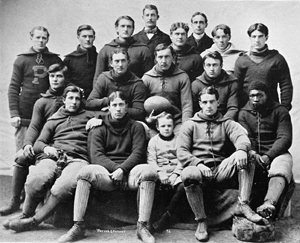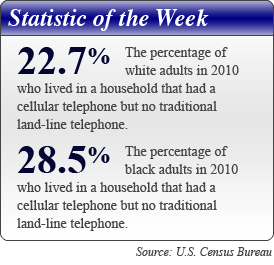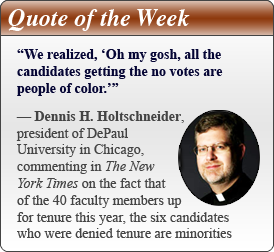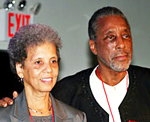Study Finds a Racial Disparity in the Perception of Fairness During the Tenuring Process at the Nation’s Law Schools
 A new study supported by the American Bar Association and the Law School Admission Council has found a racial disparity in the perception of fairness during the tenuring process at American law schools. The study, authored by Katherine Barnes of the University of Arizona and Elizabeth Mertz of the University of Wisconsin, surveyed tenured law professors from across the nation. Some 77 percent of these law professors stated that they believed the tenuring process at their law school was fair. But only 65 percent of minority law professors thought the process was fair. A new study supported by the American Bar Association and the Law School Admission Council has found a racial disparity in the perception of fairness during the tenuring process at American law schools. The study, authored by Katherine Barnes of the University of Arizona and Elizabeth Mertz of the University of Wisconsin, surveyed tenured law professors from across the nation. Some 77 percent of these law professors stated that they believed the tenuring process at their law school was fair. But only 65 percent of minority law professors thought the process was fair.
Minority women were the least satisfied. Only 54 percent thought that the process was fair.
About half of the total respondents stated that they thought the tenure review process was “easy.” But only 29 percent of minority respondents agreed. More than 60 percent of the minority women disagreed with the assertion that the tenure process was easy.
It must be noted that all respondents to this survey successfully navigated through the tenure process. It is quite probable that many of those who were denied tenure also doubted the fairness of the process.
The study, entitled “Is it Fair? Law Professors’ Perceptions of Tenure,” will appear in the Journal of Legal Education. It can be downloaded by clicking here.

OKLAHOMA STATE UNIVERSITY –
OKLAHOMA CITY

President
OSU-Oklahoma City offers a unique opportunity for an entrepreneurial and innovative leader to advance a land grant university campus in Oklahoma City and enhance education opportunities in Oklahoma and the region. The President is the chief executive leader of the forty-nine year old OSU-Oklahoma City campus. OSU-Oklahoma City’s mission is advanced technological education that culminates in associate and bachelor of technology degrees.
An advanced degree is required. We prefer candidates with an academic background who hold an earned doctorate or equivalent credential, but are also interested in nontraditional candidates. All candidates must possess a record of successful and relevant accomplishments that demonstrates the qualities listed in the position description, which is available at: www.osuokc.edu/presidentsearch/jobdesc.aspx
While applications and nominations will be accepted until a successful candidate has been appointed, interested parties are encouraged to submit their materials by February 11, 2011, to receive optimal consideration. Applicants must submit, preferably by email, a letter expressing interest in the position, a current résumé, a list of five references with contact information, and a statement of leadership philosophy for technology-oriented education to osuokcpres@okstate.edu. The website listed above also includes this link.
Gary C. Clark, Search Committee Chair
Oklahoma State University
107 Whitehurst
Stillwater, Oklahoma 74078
(405) 744-1601
Oklahoma State University – Oklahoma City is an Affirmative Action/Equal Employment Opportunity E-Verify Employer committed to diversity. OSU-Oklahoma City is a tobacco-free campus.

Historically Black University Looks to Expand Its Doctoral Programs
 This month, historically black Winston-Salem State University will begin classes in its new Ph.D. program in physical therapy. This is the first doctoral program at the university. This month, historically black Winston-Salem State University will begin classes in its new Ph.D. program in physical therapy. This is the first doctoral program at the university.
But the university is already setting its sights on additional doctoral programs. A new doctoral program for nurse practitioners is in the works but is probably two years away from fruition.
Indiana University Upgrades Its Swahili Language Program
 Swahili is a language spoken by more than 70 million people in Africa. It is one of the official languages of the African Union. Swahili is a language spoken by more than 70 million people in Africa. It is one of the official languages of the African Union.
The language is currently offered to both undergraduate and graduate students at Indiana University in Bloomington. But now the university is creating a Swahili Flagship program that aims to produce graduates who are fluent in the language. The new program is a partnership between the university, the federal government, and business groups that believe the U.S. needs students who are fluent in Swahili to compete economically in Africa and to enhance U.S. national security efforts.
The Higher Education of California’s New Attorney General
 Last week Kamala D. Harris took the oath of office as attorney general of the state of California. She is the first female and the first African American to hold the office. Last week Kamala D. Harris took the oath of office as attorney general of the state of California. She is the first female and the first African American to hold the office.
Harris’ father is from Jamaica and teaches economics at Stanford. Her mother is of Indian descent and is a physician who specializes in breast cancer. Both parents were active in the civil rights movement. Harris is a graduate of Howard University and received her legal training at the Hastings College of Law of the University of California San Francisco.
Harris was a county prosecutor in California and established an impressive record in convicting felons. This tough image propelled her to election as district attorney of San Francisco in 2003. She was reelected in 2007 and was elected attorney general of California in a close election last November.
At 46 years of age, she is considered a rising star in the Democratic Party.

UNIVERSITY OF NORTH CAROLINA WILMINGTON

Director of Development for Planned Giving
University of North Carolina Wilmington seeks qualified applicants to fill the Director of Development for Planned Giving position. The successful candidate will lead and direct UNCW’s planned giving program through the marketing of planned giving opportunities to external prospect constituents, serving as a resource to the other directors of development related to gift planning, and managing a portfolio of major gift prospects.
Requirements include a Bachelor's degree with at least five years of demonstrated, progressive experience in the design, implementation, and execution of successful fundraising programs or an equivalent combination of education and experience. Preferred education and experience include a Master's degree and a demonstrated track record of public and private development efforts including mastery of the basic principles and techniques of successful fundraising as they pertain to identification, cultivation, solicitation, and stewardship of individual, group, corporate and foundation prospects, preferably in the non-profit or higher educational sector. Experience in a higher education environment is desired. Specific training and experience in planned giving a plus.
For more information and to apply, please visit the Web at http://consensus.uncw.edu. Priority consideration will be given to applications received by January 21, 2011 but they will be accepted until the position is filled. EEO/AA Employer.

New Version of Huckleberry Finn Omits the Word “Nigger”
 Mark Twain’s The Adventures of Huckleberry Finn, published for the first time in the United States in 1885, is considered by many to be an American literary masterpiece. But many scholars are disturbed by Twain’s use of racial stereotypes and the frequent use of the word “nigger” by Huck Finn, the narrator of the story. There have been numerous incidents where the book has been banned in high school classrooms or where African-American parents have protested the use of the book in high school English classes. Mark Twain’s The Adventures of Huckleberry Finn, published for the first time in the United States in 1885, is considered by many to be an American literary masterpiece. But many scholars are disturbed by Twain’s use of racial stereotypes and the frequent use of the word “nigger” by Huck Finn, the narrator of the story. There have been numerous incidents where the book has been banned in high school classrooms or where African-American parents have protested the use of the book in high school English classes.
Now a new edition of the novel, published by NewSouth Books, has removed all instances of the use of the word “nigger” and substituted these references with the word “slave.” Alan Gribben, a professor at the Montgomery campus of Auburn University who edited the new version, told Publishers Weekly, “Race matters in these books. It’s a matter of how you express that in the 21st century.”
Critics of the change have cried “censorship” and have categorized the new edition as bowing to political correctness. But one argument in favor of the change is that the book will be less offensive to many readers and therefore may not provoke protests when it is introduced into the curriculum. So the book might receive greater exposure than before.
How do you feel about the change? Let us know by responding to this week’s poll.
A Century After Race Ended a Bitter Rivalry, Missouri and Iowa Once Again Meet on the Football Field
Late last month the University of Missouri and the University of Iowa squared off in the Insight Bowl in Tempe, Arizona. Despite the fact that they are flagship universities in adjoining states, the two schools had not met on the gridiron for 100 years.

Race was the reason the universities stopped playing against one another in 1910. The bitter rivalry, which started in the 1890s, was always controversial because Iowa fielded black players and Missouri refused to do so. At one game in 1896, Missouri fans were said to yell “Kill the Negro” at Iowa tailback Frank Holbrook. In 1910, Missouri declared it would not play Iowa if it brought black players to Columbia for a game. Iowa reluctantly agreed not to bring its black athletes, lost the game, and vowed never to return.
From that point on, the University of Missouri did not play a team with a black player until 1939 and did not have a black player on its team until 1957.
This year an unranked Iowa team got some revenge for the racial insult of a century ago, winning the Insight Bowl 27-24 over 14th-ranked Missouri.


BAYLOR UNIVERSITY

Vice Provost for Institutional Effectiveness
Baylor University announces a newly created leadership opportunity and is seeking an innovative and strategic academic administrator to serve as vice provost for institutional effectiveness. Reporting to the provost and executive vice president, the VPIE will oversee strategic planning, accreditation, assessment and institutional research.
The new VPIE will possess a broad institutional perspective with an inclusive and visionary approach, using data to help shape and support the university’s strategic and aspirational goals. The VPIE will play a leadership role in strategic planning and will consult collaboratively with senior administrators, deans and student support units across campus, proactively supporting initiatives to enhance strategic decision-making based on data and best practices.
The successful candidate will possess a terminal degree, experience with strategic planning and data driven decision making at the university level, knowledge of progressive trends in institutional effectiveness and superior analytical, communication and relationship building skills.
Baylor University is the oldest continually operating university in Texas and the largest Baptist University in the world. Classified as a research university with “high research activity” by the Carnegie Foundation for the Advancement of Teaching, Baylor blends an international reputation for educational excellence and a strong Christian commitment with a robust research program aimed at the discovery of new knowledge across all academic disciplines. With a total student enrollment of more than 14,000, Baylor offers 146 baccalaureate, 76 master and 25 doctoral degree programs across 11 academic divisions.
Nominations, expressions of interest, and applications (including a cover letter and resume) should be submitted via email to the university’s consultant, Witt/Kieffer, to the attention of Alice Miller and Jane Courson at BaylorVPIE@wittkieffer.com. Recruitment will continue until the position is filled, but for fullest consideration, applications before February 28, 2011 are encouraged. Confidential inquires may be made by emailing the above address or calling Witt/Kieffer at 678-302-1565.
Baylor is a Baptist university affiliated with the Baptist General Convention of Texas. As an Affirmative Action/Equal Employment Opportunity employer, Baylor encourages minorities, women, veterans, and persons with disabilities to apply.

Grants and Gifts
• Lincoln University, the historically black educational institution in Jefferson City, Missouri, received a $377,076 award from the U.S. Army Corps of Engineers for developing a curriculum for the U.S. Army Prime Power School.
• Morgan State University, the historically black educational institution in Baltimore, received an $85,913 grant from the Base Realignment Higher Education Fund to support two electrical engineering programs at the university.
• John Wood, associate professor at the Keck School of Medicine at the University of Southern California, has received a $100,000 grant from NFL Charities to conduct research in catastrophic muscle breakdown in African-American men with the sickle cell trait.
• Howard University in Washington received a $1.5 million grant from the U.S. Department of Health and Human Services to support retention programs for black and minority students in nursing and other health care related fields.
• Christian Brothers University in Memphis, Tennessee, received a $242,208 grant from the National Institutes of Health to support its Minority Health International Research Training program. The grant supports the university’s health care training programs in the United States, Brazil, and Uganda.
• North Carolina A&T State University in Greensboro received a $1 million grant from the U.S. Department of Education to support the university’s rehabilitation services program for traditionally underserved populations.
|
The Importance of a Black Presence at a Nation’s Most Prestigious Universities
 JBHE has always maintained that it is important for African Americans to gain admission to the nation’s leading colleges and universities because it is these institutions that in turn produce leaders for society’s institutions. Until there is a large presence of black students at these institutions of higher learning, blacks will continue to have a disproportionately small number of key positions throughout our society. JBHE has always maintained that it is important for African Americans to gain admission to the nation’s leading colleges and universities because it is these institutions that in turn produce leaders for society’s institutions. Until there is a large presence of black students at these institutions of higher learning, blacks will continue to have a disproportionately small number of key positions throughout our society.
The logic of this argument is apparent from recent statistics originating in the United Kingdom. As previously reported by JBHE, many of the leading colleges at Oxford and Cambridge universities in Britain made no offers of admission to black students this past year. Merton College at Oxford University has not admitted a black student in the past five years.
Now the British government reports that the country’s civil service accepted only five blacks among the 450 who applied to its “fast stream” recruitment program. In contrast, 5 percent of all white applicants were accepted into the program.

University Study Finds No Recent Progress in Increasing Racial Integration
 A study of 2010 census data by John Logan, a professor of sociology at Brown University, and Brian Stults, a sociologist at Florida State University, finds that although the United States is becoming increasingly diverse, racial integration of the nation’s neighborhoods is not occurring. A study of 2010 census data by John Logan, a professor of sociology at Brown University, and Brian Stults, a sociologist at Florida State University, finds that although the United States is becoming increasingly diverse, racial integration of the nation’s neighborhoods is not occurring.
The study found that the racial segregation of American neighborhoods peaked around 1960. There was slow progress in increasing racial integration between 1980 and 2000. But since then progress has come to a halt, according to Logan and Stults. Today the average white person in an urban area lives in a neighborhood that is 77 percent white. The average black person lives in a majority-black neighborhood.
African-American Physician Offers New Training Program for Caregivers of Black Alzheimer’s Patients
 Floyd B. Willis, a graduate of the Morehouse School of Medicine and chair of the department of family medicine at the Mayo Clinic, has founded a new training program in Florida for caregivers of African-American Alzheimer’s patients. The Alzheimer’s Caregiver Training and Support project is a 12-week program that can be conducted by telephone or in the classroom. The program aims to give the caregivers the skills they need to deal with their patients but at the same time bolster their own mental and physical well-being. Floyd B. Willis, a graduate of the Morehouse School of Medicine and chair of the department of family medicine at the Mayo Clinic, has founded a new training program in Florida for caregivers of African-American Alzheimer’s patients. The Alzheimer’s Caregiver Training and Support project is a 12-week program that can be conducted by telephone or in the classroom. The program aims to give the caregivers the skills they need to deal with their patients but at the same time bolster their own mental and physical well-being.

MASSACHUSETTS INSTITUTE OF TECHNOLOGY

Senior Faculty Chair in Energy for the Built Environment
The MIT Energy Initiative (MITEI), started in 2006, is an Institute-wide initiative designed to help transform the global energy system to meet the needs of the future and to help improve today's energy systems. The MIT Energy initiative is undertaking a search for a senior faculty member in the field of energy for the built environment. The faculty member will have the opportunity to work with the expanding MIT energy research and educational programs in architecture, building technology, urban studies, and engineering applied to the built environment. Programs range from those focused on large urban areas, through community level, individual buildings to building components.
The emphasis of the search is on candidates who will provide leadership for new initiatives in energy that will integrate and build on existing programs at MIT and initiate new research directions. The successful candidate could be appointed in the School of Architecture and Planning or in the School of Engineering, or could have a joint appointment in more than one department. The candidate should have an outstanding record of research and teaching and should thrive in a multidisciplinary environment. Research could address a number of areas related to the built environment such as policy, economics, and system planning and implementation to achieve major energy objectives, as well as research creating passive and active designs of energy efficient buildings urban environments, and advanced technologies.
Interested candidates should send applications or inquires to Professor Leon Glicksman, Chair, Search Committee, Room 5-418, MIT, 77 Massachusetts Ave., Cambridge, MA, 02139 or kross@mit.edu. Complete applications should include curriculum vitae, a three to five page statement outlining energy related scholarship, research, teaching, professional and institutional service, three to five sample publications, along with the names of five or more references. Other media can be submitted where appropriate. It is anticipated that candidate interviews will take place in early spring 2011 with the successful candidate appointed and in place as early as fall 2011.
MIT is a culturally diverse faculty and strongly encourages applications from women and minority candidates.

Cornell University Launches New Human Rights Institute Named After Civil Rights Icon Dorothy Cotton
 Cornell University has established the Dorothy Cotton Institute to honor the longtime civil rights activist and former director of student activities at the university. Cornell University has established the Dorothy Cotton Institute to honor the longtime civil rights activist and former director of student activities at the university.
Cotton, now 80 years old, worked directly with Martin Luther King Jr. as the education director of the Southern Christian Leadership Conference. She was registered in the room next to King at the Lorraine Motel in Memphis on the day King was assassinated.
The new institute aims to become an internationally renowned education and resource center to “develop, nurture, and train leaders for a global human rights movement; build a network and community of human rights leadership; and explore, share and promote practices that transform individuals and communities, opening new pathways to peace, justice and healing.”
The institute will hold an annual conference and conduct education and training programs on human rights.
Henry Louis Gates Jr. Honored in China
 Last month, scholars from across China convened at Beijing Foreign Studies University to honor Henry Louis Gates Jr., the Alphonse Fletcher University Professor and director of the W.E.B. Du Bois Institute for African and African American Research at Harvard University. More than 50 scholars presented papers on Gates’ work at the conference, which coincided with the publication of several of the Harvard professor’s works in Chinese. Professor Gates stated that the conference in China was “truly one of the greatest honors of my career.” Last month, scholars from across China convened at Beijing Foreign Studies University to honor Henry Louis Gates Jr., the Alphonse Fletcher University Professor and director of the W.E.B. Du Bois Institute for African and African American Research at Harvard University. More than 50 scholars presented papers on Gates’ work at the conference, which coincided with the publication of several of the Harvard professor’s works in Chinese. Professor Gates stated that the conference in China was “truly one of the greatest honors of my career.”

UNIVERSITY OF CHICAGO

Assistant Vice President for Student Health and Counseling Services
Experienced, visionary physician administrator with stature and capacity to integrate all health-related programs for students into one outstanding, comprehensive health and counseling service. Will 1) lead and manage transition from separate health-related programs to a unified service, 2) provide strategic leadership, direction and management for health, counseling, health promotion, and insurance operations, programs, and services, 3) direct the efforts, with input from students, to improve the health status of all students, 4) supervise directors in counseling, administration, and health promotion, 5) serve as medical director, including supervision of an assistant medical director, primary care physicians and mid-level providers, 6) lead institutional response to issues pertinent to the health and well-being of students and for campus public health emergencies, 7) provide liaison with the University of Chicago Medical Center, and 8) provide direct primary care to students.
Requires MD, current Board certification in a primary care specialty, active and unrestricted license to practice medicine in Illinois, at least 8 years’ post-doctoral clinical experience, and at least five years’ progressive health care administrative and management experience. Experience in college health desirable but not required.
This is a full-time, senior administrative position. The successful candidate will be qualified to have an appointment as a Clinical Associate in the Department of Medicine. Salary is commensurate with qualifications and experience. Apply online only to Requisition #086195: https://jobopportunities.uchicago.edu. Email questions to Recruiting@Keelingassociates.com. The University of Chicago is an Equal Opportunity/Affirmative Action Employer.

In Memoriam
Goldie L. Ivory (1926-2010)
 Goldie L. Ivory, an educator who is said to have been the first black lay woman to earn a degree from the University of Notre Dame, died last month at a hospital in South Bend, Indiana. She was 84 years old. Goldie L. Ivory, an educator who is said to have been the first black lay woman to earn a degree from the University of Notre Dame, died last month at a hospital in South Bend, Indiana. She was 84 years old.
Ivory was a native of Chicago. In 1949 she graduated from Indiana University and took a job with the St. Joseph County Juvenile Department. Married with twins, at age 30 she earned a master’s degree in sociology at the University of Notre Dame in 1956. She later earned a second master’s degree in social work from Indiana University.
Ivory spent a major portion of her professional career as director of human resources for the Elkhart Community School System. She also taught at St. Mary’s College and Goshen College.
Dorothy Marie Penman Harrison (1907-2010)
 Dorothy Penman Harrison, the former president of Delta Sigma Theta sorority, died last month in Flossmoor, Illinois. She was 103 years old. Dorothy Penman Harrison, the former president of Delta Sigma Theta sorority, died last month in Flossmoor, Illinois. She was 103 years old.
Harrison was a native of Portsmouth, Ohio. She attended Fisk University, but when her parents died she returned home to Ohio and later earned a degree at Ohio State University. In 1940 she married G. Lamar Harrison, who would become president of what is now Langston University, the historically black educational institution in Oklahoma. Harrison earned a master’s degree in education at Oklahoma State University. She was elected national president of Delta Sigma Theta in 1956.
Appointments, Promotions, and Resignations
 • Nikki R. Jackson was appointed vice chancellor for human resources at the Maricopa County Community Colleges in Arizona. She was serving as the personnel cabinet secretary for the governor of Kentucky. • Nikki R. Jackson was appointed vice chancellor for human resources at the Maricopa County Community Colleges in Arizona. She was serving as the personnel cabinet secretary for the governor of Kentucky.
Jackson is a graduate of Hampton University and the University of Miami School of Law.
 • Doris Terry Williams was elected to the board of trustees of Vance-Granville Community College in Henderson, North Carolina. She is the executive director of the Rural School and Community Trust, a nonprofit organization that has the goal of improving schools in rural areas. • Doris Terry Williams was elected to the board of trustees of Vance-Granville Community College in Henderson, North Carolina. She is the executive director of the Rural School and Community Trust, a nonprofit organization that has the goal of improving schools in rural areas.
A graduate of Duke University, Dr. Williams holds master’s and doctoral degrees from North Carolina State University.
 • Marcia Chatelain, an assistant professor of African-American studies at the University of Oklahoma, was selected as a 2011 American Marshall Memorial Fellow. The fellowship program was launched in 1999 by the German Marshall Fund of the United States to establish transatlantic academic collaborations. • Marcia Chatelain, an assistant professor of African-American studies at the University of Oklahoma, was selected as a 2011 American Marshall Memorial Fellow. The fellowship program was launched in 1999 by the German Marshall Fund of the United States to establish transatlantic academic collaborations.
Dr. Chatelain holds master’s and doctoral degrees in American civilization from Brown University.
 • Stephanie E. Phillips was appointed federal relations officer at Hampton University in Virginia. She will be the university’s liaison with federal agency officials and congressional staff. She has served on the staff of the White House Initiative on Historically Black Colleges and Universities. • Stephanie E. Phillips was appointed federal relations officer at Hampton University in Virginia. She will be the university’s liaison with federal agency officials and congressional staff. She has served on the staff of the White House Initiative on Historically Black Colleges and Universities.
Phillips is a graduate of Texas Southern University and holds a master’s degree in social work from the University of Texas. She is currently pursuing an educational doctorate at the University of Texas.
 • George W. Reid was appointed executive director of the Illinois Board of Higher Education. He was assistant secretary of planning and academic affairs at the Maryland Higher Education Commission. He previously served as president of Kentucky State University. • George W. Reid was appointed executive director of the Illinois Board of Higher Education. He was assistant secretary of planning and academic affairs at the Maryland Higher Education Commission. He previously served as president of Kentucky State University.
Dr. Reid holds bachelor’s and master’s degrees from North Carolina Central University and a Ph.D. in history from Howard University.
 • W. Franklyn Richardson, senior pastor of Grace Baptist Church in Mount Vernon, New York, was elected chair of the board of trustees of Virginia Union University in Richmond. • W. Franklyn Richardson, senior pastor of Grace Baptist Church in Mount Vernon, New York, was elected chair of the board of trustees of Virginia Union University in Richmond.
Dr. Richardson is a graduate of Virginia Union University and the Yale Divinity School. He holds a doctor of ministry degree from the United Theological Seminary in Dayton, Ohio.
Honors and Awards
• Kokahvah Zauditu-Selassie, associate professor of English at Coppin State University in Baltimore, Maryland, received the 2010 Book Prize in the single author category from the Toni Morrison Society. Professor Zauditu-Selassie was honored for her book African Spiritual Tradition in the Novels of Toni Morrison (University of Florida Press).
 • The Black Alumni Association at Cornell University has established a scholarship fund to honor Janice and James Turner. Janice Turner is the former associate dean of the College of Arts and Sciences at Cornell. James Turner, professor of African-American politics and social policy, was the founding director of the university’s Africana Studies and Research Center. • The Black Alumni Association at Cornell University has established a scholarship fund to honor Janice and James Turner. Janice Turner is the former associate dean of the College of Arts and Sciences at Cornell. James Turner, professor of African-American politics and social policy, was the founding director of the university’s Africana Studies and Research Center.
|
 .
.